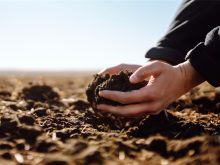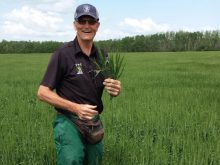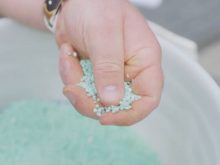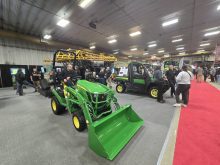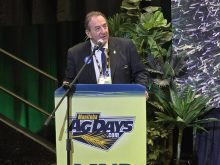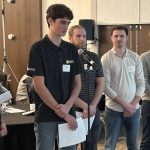You’ve probably seen Dr. Mario Tenuta at an ag field day or a soil seminar. He’s the guy in the Hawaiian shirt, having a good time giving a presentation about new soil research or talking to farmers about what’s going on at their farms.
Tenuta is a tenured soil ecology professor at the University of Manitoba, currently serving as the senior industrial chair in 4R nutrient management. He’s a research scientist, the kind of academic you might expect to find working in a lab, dressed in a white coat. But Tenuta is out of the lab every chance he gets, making sure his research is focused on farmers’ real-world problems and making sure new research results are accessible to the industry.
This is not a typical career for someone who grew up in the Toronto suburb of Brampton. How did Tenuta get from a botany student in downtown Toronto to a Brandon crop show soil pit? And why does he care about western Canadian farmers?
Read Also
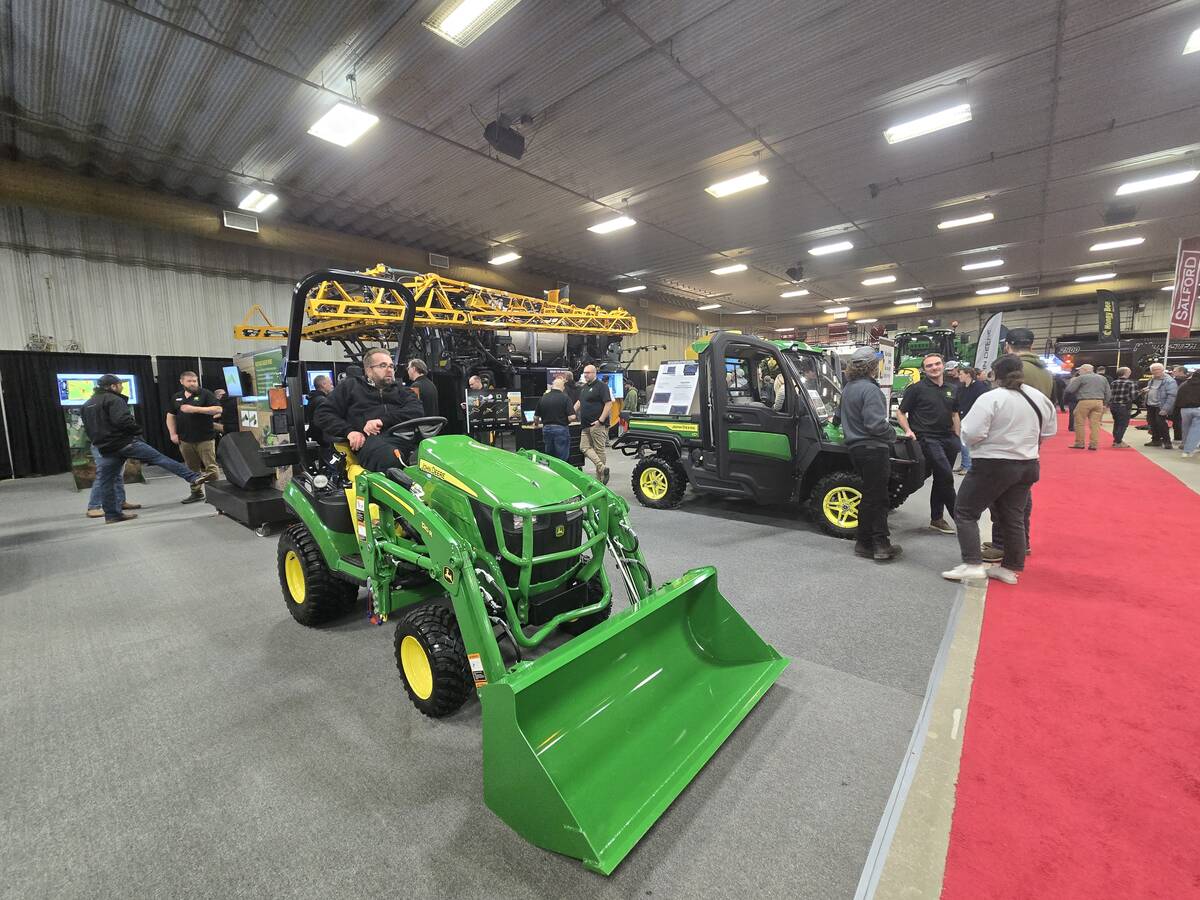
Manitoba John Deere dealers plan merger
Two retail dealership chains handling John Deere farm equipment in Manitoba say they plan to merge, bringing 13 locations under one organizational umbrella.
It started at home
Tenuta’s parents immigrated to Canada from rural southern Italy in the 1950s. Growing their own vegetables and fruit and even slaughtering goats, chicken and rabbits was the normal way of life.
“Self-sufficiency was a big component of surviving, historically, for the people there. When they came to Canada,” he says, “they brought a bit of a time capsule with them.”
This included growing their own food.
“If we weren’t growing it, we were buying it directly from a farmer, like chickens or rabbits or goats.” The Tenuta family had a dedicated insulated cellar in the basement to store wine, cold cuts and other preserves — the cantina, in Italian. A fig tree grew outside in a greenhouse, and there were plants throughout the house.

Tenuta was taken with botany. “As soon as I learned about photosynthesis, I said ‘Oh, that’s the coolest!’ I was disappointed I wasn’t born a plant when I heard that they make their own energy.”
And then there was the grass.
“My dad would go every year and get poultry manure from a farmer, and spread it on the lawn,” Tenuta says. “My dad knew that chicken manure was the best fertilizer.”
Later, Tenuta would learn that this is because chicken manure contains nitrogen and phosphorus. At the time, he was more concerned about how the manure would smell after rain.
“I’d be pretty embarrassed walking home from school. I could smell the house from half a mile away.”
With this background, nutrient management is an obvious fit for Tenuta. Even if he did start his academic career in downtown Toronto.
Getting out of the city
As an undergraduate in Toronto, Tenuta spent a lot of time outside the city. “I loved plants, so every weekend I’d go off and take my guidebooks and identify plants.”
Soon, many of his university projects were focused on the ground the plants grow in. Like many students, Tenuta was influenced by a professor who saw his potential. For Tenuta, this was ecologist Dr. Tom Hutchinson. Hutchinson spotted Tenuta’s interest in plants and encouraged his soil-based projects. Tenuta showed more drive than many undergraduate students, driving from Toronto to Guelph to read the latest research journals. (Research relied much more on location in those pre-internet days of the early 1980s.)
As he was finishing his first degree, Tenuta got a summer research job in Churchill, Man., studying goose poop and nitrogen mineralization. The experience left him hooked on learning about soil health.
“I was in the middle of nowhere with test tubes, soil and goose poop samples. It was wonderful.”
It was when he began studying at the University of Guelph that he really had a chance to “dig in” to soil science. Guelph was also where he realized how much he had to learn. Not just the chemistry, biology and physics of soil science, but also Ontario agriculture.
“I would spend weekends at farm shows,” he says. Tenuta’s brother, Albert Tenuta, is a plant pathologist in Ontario. When Tenuta landed in Guelph, Albert was already working at the Ontario Ministry of Agriculture, Food and Rural Affairs. When Albert and his colleagues put on conferences or workshops, Tenuta says, “I would just show up and learn.”
This willingness to delve into a new environment, to listen, and to ask questions, is the trait that’s served Tenuta well throughout his career, and it’s what makes his work useful for farmers and the agriculture industry.
Becoming an agronomist
Instead of talking about the day he graduated with a masters’ degree from the University of Guelph, or the day he finished his PhD thesis at Western University, Tenuta is proud of the day he became an unofficial agronomist — a professional who could offer farmers practical, useful advice.
That day came when a professor he greatly admired, the late soil scientist Dr. Eric Beauchamp at the University of Guelph, was working on a problem for a local farmer. Beauchamp brought Tenuta in to help find a solution. “He said, ‘We’re agronomists. Let’s think about this.’”
This was the first time anyone referred to Tenuta as an agronomist, someone who could bring useful skills to a real-life farm problem.
“It was a little thing, but it was really massive in terms of helping me create some confidence.”
One opportunity led to another, and soon Tenuta found himself with a PhD learning how nitrogen and amendments can control potato pathogens. Then immediately afterwards he was off to the University of California, Davis for a post-doctoral fellowship. He was studying nematodes as indicators of soil health and learning about California agriculture.
Near the end of his contract, the University of Manitoba happened to have an opening in their soil science department, so he flew to Winnipeg for an interview.
“I had all intentions to go back to California. I was loving it there.” There was funding to extend his research contract, and the weather was definitely better just west of Sacramento.
But Tenuta liked his trip to Winnipeg. He liked the people he would be working with (“there didn’t seem to be any infighting”), and, given the importance of agriculture to Manitoba’s economy, he saw that research work on soil health in Manitoba had the potential to be especially useful.
Back to square one
When he moved to Winnipeg in 2002, Tenuta had strong academic and research credentials, but, once again, very little knowledge of the local agriculture industry. He needed to learn about prairie crop production, including the details of farm machinery and the business aspects of grain farming.
Tenuta was lucky to land in an office down the hall from well-known soil scientist Don Flaten. “He was my sounding board.”
Flaten was welcoming and encouraging; Tenuta was never afraid to go to Flaten’s office with questions like, “What’s a mid-row bander?”
As well as talking to Flaten, Tenuta also sought out the people he wanted to help: farmers.

Prairie farmers are lucky to have access to several academic research scientists who take time to understand how their research connects to real-world production practices. When researchers understand the pressures farmers face and how farmers balance multiple factors to make decisions, they are better equipped to design research projects that solve farmers’ problems and communicate solutions so they can be used in the field.
“Sometimes there’s an expectation that you’re a researcher, you’re a professor, you know it all already,” Tenuta says. We’ve all seen someone in a position of authority who’s afraid to admit they don’t know something. But Tenuta would never try that. “Especially not in a room full of farmers!”
Throughout his career Tenuta has made time to learn directly from farmers, as well as searching out information everywhere from podcasts to print magazines.
His form of learning is a two-way street. “I love it when people ask questions, because that challenges me, and it’s me scratching my head. And that also leads to new questions to ask. If somebody’s asking something, that means there’s a knowledge gap. And that means there’s a need.”
Tenuta tries to focus his research where it will be useful. Farmers coming forward with similar questions, or bringing requests through commodity associations, helps Tenuta identify research needs. When farmers push producer-run commodity groups to invest farmers’ money in specific areas, it’s easier for researchers like Tenuta to attract matching provincial and federal government funding to work on the problem.
When government staff realize “somebody cares about this research,” Tenuta says, “they’re willing to sponsor a portion of it.”
Dual roles
When they’re successful, scientists like Tenuta are balancing two extremely different roles: as communicators providing practical information to the agriculture industry, and as academics in the world of teaching, lab work and research publications.
“We’re servicing a sector, an economic sector — agriculture and industry. And at the same time, we’re in an institution of higher learning and we’re fostering knowledge creation and training students.”
Choosing the right research projects is key to making this work.
“We’re always trying to find something that’s fundamentally interesting and new in terms of knowledge.” That’s the academic side — university researchers are expected to break new ground.
But to also be a good communicator, and useful to the industry, the work must be relevant. “There’s the commodity and farmer route.
“It’s kind of like having feet in two different areas and bridging them.”
Tenuta believes the foundation for success in both these roles is to keep learning.
When Tenuta goes to his campus office he tells his kids and wife, “I’m going to school.” They make fun of him, he says. His 15- and 12-year-old children are still at the age when the idea of one day leaving school seems exciting.
But not for Tenuta.
“I’m still in school. I’ve never left school.”



